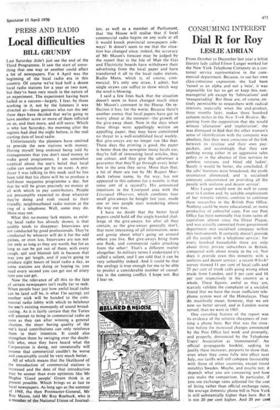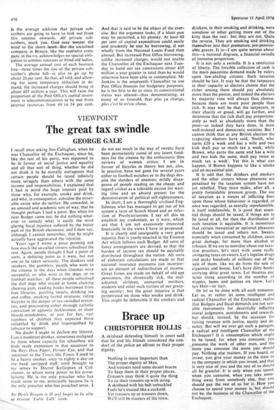CONSUMING INTEREST
Dial R for Roy
LESLIE ADRIAN
From October to December last year a leftist literary lady called Elinor Langer worked for the New York Telephone Company as a cus- tomer service representative in the com- mercial department. Because, to use her own class-conscious expression, she had been 'raised as an alpha and not a beta', it was impossible for her to get or keep this non- managerial job except by 'fabrications' and 'masquerading'. But these are, of course, en- tirely permissible to researchers with radical interests, especially when the end-product, three months later, makes three hundred column-inches in the New York Review. Be- ginning from the supposition that she would witness 'alienation' and 'exploitation', she was dismayed to find that the other women's sense of identification with the company was absolute, that they were conscious of the link between its revenue and their own pay- packets, and accordingly that they saw nothing wrong either in an aggressive sales policy or in the absence of free services to 'armless veterans and blind old ladies'. Surely it would be better, she concluded, if the jobs' horizons were broadened, the profit orientation eliminated, and 'a socialised company concentrated on providing all the people with uniform and decent service'.
Miss Langer would now do well to come over to London and, by suitable employment of her mimetic talents, contrive to continue these researches in the British Post Office. Nothing could be more educational, or more productive of colourful copy. For our Post Office has been nominally free from taints of capitalism almost since the Great Plague, and was actually converted from government department into socialised company within this twelvemonth. It certainly doesn't provide all the people with a telephone service: for every hundred households there are only about thirty private subscribers in Britain, compared with about ninety in the us. Nor does it provide even this minority with a uniform and decent service: a recent Which? survey showed 11 per cent of local calls and 25 per cent of trunk calls going wrong when made from London, and 8 per cent and 16 per cent respectively in the country as a whole. These figures, awful as they are, scarcely validate the complaint of a socialist friend that we have the most inefficient tele- phone system west of the Himalayas. They do manifestly mean, however, that we are now no better served, and in London worse served, than we were in 1965.
One consoling feature of the report was its evidence of the relative cheapness of run- ning a phone here. But that was the situa- tion before the increased charges announced by the Post Office last week and promptly, and properly, denounced by the Telephone Users' Association as 'monumental'. An official propaganda booklet, seeking to justify these increases, purports to show that, even when they come fully into effect next July, our tariffs will still compare favourably with those of other countries, except (most notably) Sweden. Maybe, and maybe not; it depends what you are comparing and how
you make the comparison. In particular, if you use exchange rates adjusted for the cost
of living rather than official exchange rates, the average domestic phone bill in New York is still substantially higher than here. But it is not 20 per cent higher. And 20 per cent is the average addition that private sub- scribers are going to have to fork out from this summer onwards. Al! private sub- scribers, mark you. God may temper the wind to the shorn lamb.- But the socialised company in Britain, like the capitalist- corn' pany in the us, acknowledges no special obli- gation to armless veterans or blind old ladies,
The average annual cost of each business line—three times the size of the private sub- scriber's phone bill—is also to go up by about 20 per cent. So that, all told, and allow. ing for some temporary reduction in de- mand, the increased charges should bring in about £65 million a year. This will raise the proportion of the Post Office's capital invest- ment in telecommunications to be met from internal resources from 40 to 54 per cent.
And that is said to be the object of the exer. cise. But the argument looks, if a blunt pun may be permitted, a bit phoney. At least 60 per cent of capital expenditure could easily and prudendy be met by borrowing, if not wholly from the National Loans Fund then abroad. But increased Post Office borrowing, unlike increased charges, would not enable the Chancellor of the Exchequer next Tues- day to hand out tax concessions about £65 million a year greater in total than he would otherwise have been able to contemplate. Mr Jenkins is the umpteenth Chancellor to use Post Office finances for budgetary purposes; he is the first to do so since its constitutional status was altered—thus demonstrating, as many of us foretold, that plus ga change, plus c'est la menze chose,







































 Previous page
Previous page